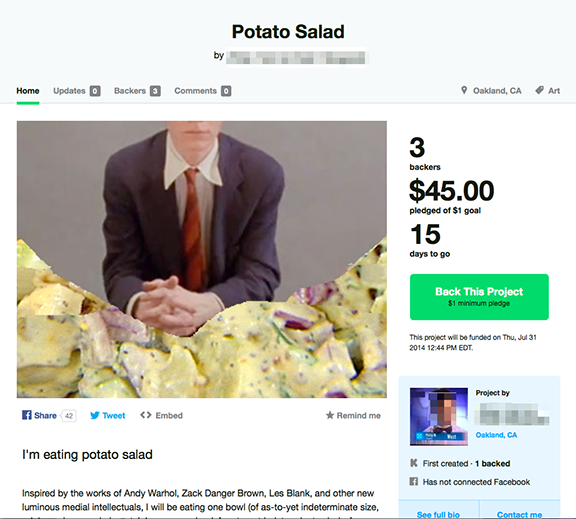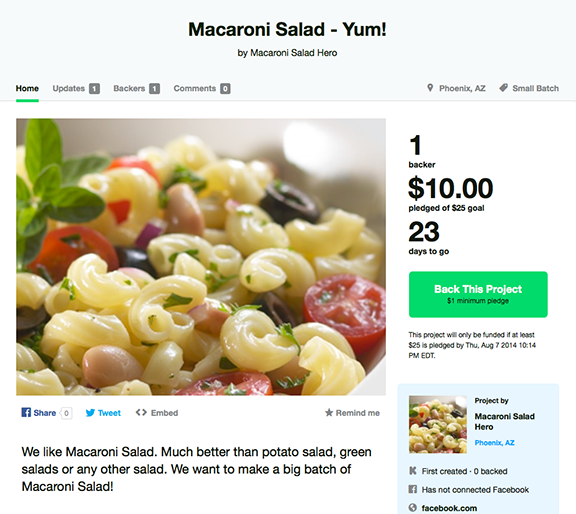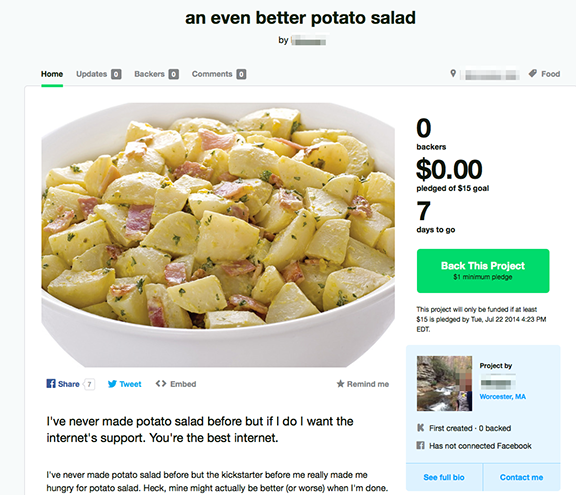People love to laugh, which is why marketers continue to generate funny content in the hopes of attracting attention to their products and services. Humor is also a great thing to include in your presentations—you set the audience at ease and make them more receptive to your message. But rehashing other people’s ideas in an attempt to make them your own can backfire in a big way.
The famous potato salad Kickstarter campaign
Zack Danger Brown. If you haven’t heard that name before, perhaps you’ve heard of his famous potato salad Kickstarter campaign. As a joke, Brown asked for $10 so that he could make some potato salad. He offered incentives such as a photo of him making the potato salad and a bite of the salad once it was finished. As of July 15, 2014, he had raised 503834% of his original goal. That’s $50,383.40.
This is an amazing achievement and a testimony to the power of pop culture. I’m sure that none of his backers seriously believe that they will actually receive a taste of the potato salad. They probably donated because it was such a ridiculous idea that it seemed funny. And it is.
It’s hard to predict what will make a Kickstarter campaign, or anything for that matter, go viral. One thing is certain, however. You can’t repeat the process and come across as a fresh, original voice.
Enter the copycats
After the runaway success of Brown’s campaign, the copycats started coming:
This guy will eat potato salad
This guy prefers macaroni salad
Each of these campaigns got some backing, but not much. By the time these were created, the potato salad joke was played out. It’s one thing to throw money at something ridiculous just because it’s funny. But people don’t tend to do it more than once. At least not more than once a month. As quick as these copycats were in starting these campaigns, their efforts were DOA.
Diminishing returns
Hoping for the same Internet notoriety that Brown received, a young woman from Worcester, Massachusetts, started her own Kickstarter potato salad campaign. She claimed that her potato salad would be “even better.” But take a look at this screen shot:
No backers. Why not? Because her campaign is almost an exact copy of the original. At least the other campaigns had some kind of a twist.
What this means for you
What does all this have to do with marketing and PowerPoint? Easy. We marketers and PowerPoint users are always looking for ways to keep our audiences focused and interested. Humor is a great way to achieve those goals. But you have to be fresh and original.
Does this mean that the Potato Salad Joke is forever off limits? Not necessarily. Referring to it in your marketing or presentations will demonstrate that you have a handle on pop culture. (But only if you do it right now. Try talking about it next year and people might start calling you “Grandpa.”) Copying the joke? That’s another matter entirely.
When you’re trying to create humorous marketing, the most effective tactic is originality. You have to be the first one to tell the joke. If you do decide to copy someone else’s idea, you have to give it some kind of original spin. It’s OK to refer to another funny joke, viral video, or whatever. A straight-up ripoff is cheating, unless you’re so over-the-top ripping off the joke that that in itself is funny.
It’s not easy coming up with original jokes. But one of the best ways to look lame to your audience is to give a lousy rendition of somebody else’s already-played-out joke. You appear out of touch, unoriginal, and maybe even slightly dishonest because you’re using somebody else’s material.
Humor is hard! But if you’re able to pull it off, it can make your marketing memorable, sharable, and effective.



